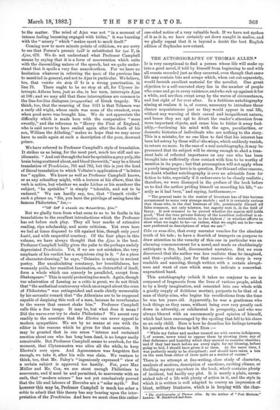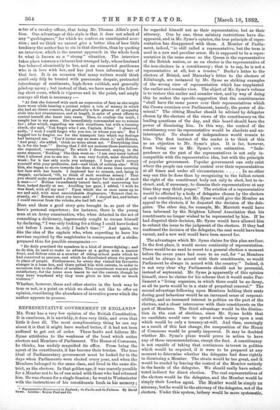THE AUTOBIOGRAPHY OF THOMAS ALLEN.*
IT is very exceptional to find a person whose life will make up into a good novel, if told by himself from beginning to end with all events recorded just as they occurred, even though that same life may contain bits and scraps which, when cut oat separately, would furnish excellent material for the novelist. One great objection to a self-narrated story lies in the number of people who come and go in every existence, and who rub up against it for a while, and are then swept away by the waves of circumstance,. and lost sight of for ever after. In a fictitious autobiography aiming at realism it is, of course, necessary to introduce these chance acquaintances just as they would appear in real life,. without any warning of their casual and insignificant nature,. and hence they are apt to divert the reader's attention from more important objects, and cause him to fritter it away fool- ishly,—burdening his mind with the ages, peculiarities, or domestic histories of individuals who are nothing to the story.. This is a mistake, for no one likes to find that his interest has been led astray by these will-o'-the wisps, which suddenly vanish, to return no more. In the case of a real autobiography, it may be presumed that its subject will be strong enough to shed a tran- sient halo of reflected importance on any one who has been brought into sufficiently close contact with him to be worthy of mention in its pages ; but that presumption will not apply when a purely imaginary hero is in question. For this and other reasons,. we doubt whether autobiography is ever an advisable form for fiction to take, especially if it endeavours to be closely realistic ; therefore, we were dismayed in the preface of the book before us to find the author priding himself on recording his life, " ex- actly as it had been," and saying, furthermore,- " The general taste in the matter of literature has of late become accustomed to some very strange models ; and it is certainly curious that those who, in the real business of life, persistently discard all false romance, not only tolerate, but eagerly seek it, in the field of fancy. It now remains to be proved whether the maxim still holds good, That the true private history of the humblest individual is at- tractive, as well as instructive, to the highest ;' or whether efforts to. show what we ought to be—or rather, what we ought not to be—are now preferred to descriptions of what we are."
Oda va sans dire, that every narrator vouches for the absolute. truth of his tale ; to have a flourish of trumpets on purpose to. draw attention to the veracity of this one in particular was an alarming commencement for a novel, and made us shudderingly anticipate -a dry, bald, disconnected narrative. But we soon discovered that the author was less realistic than he imagined, and that—probably, just for that reason—his story is very readable and amusing, though written with a certain abrupt- ness and want of ease which seem to indicate a somewhat. unpractised hand.
This autobiography (which it takes no conjuror to see is composed of fragments from the lives of various people, added. to by a lively imagination, and cemented into one whole with a goodly supply of fictitious mortar), purports to be that of a. man of thirty-nine, who begins his recollections from the time he was ten years old. Apparently, he was a gentleman who took things as they came, without being ever very greatly cast down in adversity, or exhilarated in prosperity, and who was always blessed with an uncommonly good opinion of himself, which had been encouraged by the spoiling that fell tp his share as an only child. Here is how he describes his feelings towards his parents at the time he left Eton :—
" While my father and mother treated me with unwise indulgence, I, of course, never tried to oppose them by showing them any of that deference and humility which they seemed to consider obsolete; and if they had knelt before me every night for my blessing, before going to bed, I should have given it to them. At the same time, I was perfectly ready to be disciplined ; and should have taken a box on the ears from either of them quite as a matter of course."
There is no attempt at fine-writing, close study of character, analysis of motives, description of emotions, exciting climax, or
thrilling mystery anywhere in the book, which contains plenty of incident, but hardly any plot. It is merely a plain, unvar- nished tale of a life with plenty of action in it, and the style in which it is written is well adapted to convey an impression of blunt, military frankness, which is in keeping with the char - • The Autobiography of Thomas Allen. By the Author of " Post Yortein."' London W. Blackwood and Sons.
acter of a cavalry officer, that being Mr. Thomas Allen's posi- tion. One advantage of this style is that it does not admit of any " gushingness," for which we confess an unmitigated aver- sion ; and we think we cannot give a better idea of how little tendency the author has to sin in that direction, than by quoting an interview, which is the nearest approach in the whole book to what is known as a " strong" situation. The interview takes place between a virtuous but wronged lady, whose husband has behaved abominably to her, and an unmarried gentleman who is in love with her, and has just been informing her of that fact. It is an occasion that many writers would think could only fitly be treated with passionate despair, protracted interchange of sentiments, high-flown rubbish, and generally piled-up agony ; but instead of that, we have merely the follow- ing short scene, which is vigorous and to the point, and amply conveys all that is necessary :—
" At first she listened with such an expression of face as she might have worn while hearing a patient relate a tale of misery in which she had no direct concern, but gradually a few gleams of sympathy stole into her countenance, and at length, in spite of great efforts to control herself, she burst into tears. Then, to confess the truth, I caught her in my arms. She immediately commanded me to release ler • after which, regarding me with steadiness, but with a burning cheek, she said, ' You forget who I am, Captain Allen.' I observed, sadly, I wish I could forget who you are, or whose you are.' But I begged her to forgive me for the transport into which my feelings had betrayed me. You'd better say no more about it,' said Helena. 'And pray,' she added, think no more about me. " Everything that is, is for the best." ' Seeing that I did not endorse these sentiments, she repeated, everything.' To which I dissented, saying, in the same manner, Nothing.' She then went on : ' I am very sorry indeed that I allowed you to see me. It was very foolish, most dreadfully weak ; for it has only made you unhappy. I hope you'll occupy yourself with your profession, and—and think of nothing else.' With this, she began to move towards the door, at the same time covering her face with her hands. I implored her to remain, and, being in despair, exclaimed, Oh, to think of such needless misery ! That you should make yourself a slave and a martyr for the sake of such a man—' Helena immediately turned back, and uncovering her face, looked fixedly at me. Avoiding her gaze, I added, I wish he was dead, with all my soul !' Upon which she at once came up to me and said, with most unmistakable displeasure, Retract that in- stantly, sir ! Retract what you have said !' I obeyed her, and before I could recover from the rebuke, she had left me."
Here and there a good story gets brought in, as part of the iiero's personal experience ; for instance, there is the young man at an Army examination, who, when detected in the act of consulting a dictionary, ingenuously sought to excuse himself by declaring, " I was only looking for a thing I could have looked out before I came in, only I hadn't time !" And again, we like the idea of the captain who, when expecting to have his services required by the magistrates in consequence of a strike, prepared thus for possible emergencies :— " He daily practised the squadron in a kind of street-fighting ; and to do this, he used to make us advance at a gallop with a narrow front, and deliver cats at a number of riding school posts which he bad contrived to procure, and which he distributed about the ground in place of people. Furthermore, he every day visited his favourite charger in a loose box, and there pelted him with carrots, in order to accustom him to the effect of missiles. This experiment was not quite satisfactory, for the horse soon learnt to eat the carrots, though he -may have wondered why they were given to him with so much violence."
Whether, however, these and other stories in the book may be true or not, is a point on which we should not like to offer an -opinion, considering the abundance of inventive power which the -author appears to possess.



































 Previous page
Previous page